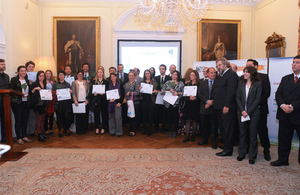Third edition of the CCAB Sustainable Leadership Awards
The Argentine-British Chamber of Commerce announced the winners of the Sustainable Leadership Awards.

Winners of the CCAB's Sustainable leadership prize/ Ganadores del Premio al Liderazgo Sostenible de la CCAB
The National University of Córdoba’s Hemoderivatives Lab won the CCAB Excellence in Sustainability award for its positive impact on the community, high degree of innovation at the implementation level and strong leadership in the field of sustainability.
The award was given to 23 innovative sustainable projects with a high impact on the community. The competing candidates included initiatives, projects and ideas from all over the country. This year, 67 entries were received, representing a 10% increase on last year. This shows a clear commitment to sustainability from the country’s companies, organisations, public sector and individuals, as well as their concern about the sustainability of our planet and our future.
Julián Rooney, Chairman of the CCAB, said:
Once again, those who are trying to make this country more sustainable have contributed their work and initiatives to this award of which we are proud. Delivering to the community project and ideas that take into account social inclusion as well as the environmental and economic dimensions is a duty that we have undertaken as an organisation.

The British Ambassador John Freeman handed out the Excellency Prize/ El Embajador Británico John Freeman entregó el Premio a la Excelencia.
The winners in the Innovative Organisation category were:
Large companies
First prize:
Arauco Argentina S.A., for their project “Use of Forest Biomass for Energy Generation”; and Unilever Argentina S.A., for their project “Sustainable Brands”.
Second prize:
Kimberly-Clark Argentina for their project “Towards Zero Waste”.
Third prize:
Banco Galicia for their project “Mezzo-Level Finances”.
SMEs
First prize:
Colonial-style restaurant Pulpería Quilapán, for their project “A bridge between sustainable products and responsible consumers”.
Second prize:
ESARQ - Swiecicki Architecture Firm.
Third prize:
Maggacup.
Microenterprises and independent professionals
First prize:
Dina Stasta, for her project “Second Cycle – Sustainable Production”.
Second prize:
Eco-Live, for their project “100% Biodegradable Bags”.
Third prize:
Plant Them.
NGOs
First prize:
AMIA-BID-FOMIN, for their project “Value of CSR + Competitiveness”.
Second prize:
Fundación Cruzada Patagónica, for their project “Renewable Energy Sources- Educating for the Future”.
Third prize:
Fundación Equidad, for their project “Computer Recycling Workshop”; and Asociación Civil Ingeniería Sin Fronteras Argentina, for their project “Water and Energy in the village of El Negrito, province of Santiago del Estero”.
Public Sector
First prize:
Universidad Nacional de Córdoba, for their “Hemoderivatives Lab – a Social, Synergic and Sustainable Business Model”.
Second prize:
Ministry of Social Development, Government of the City of Buenos Aires, for their project “Zonal Social Services”.
Third prize:
Risk Management Department, Municipality of the City of Santa Fe, for their project “Urban Natural Reserve and Climate Risk Management”.
Mixed projects
First prize:
Coca-Cola Argentina, for their project “Coca-Cola’s commitment on water stewardship: replenishing every drop”.
Second prize:
Samsung Electronics Argentina, for their project “Gran Chaco Nanum Village”.
Third prize:
Fundación Cruzada Patagónica, for their project “Access to Water for Rural Communities of Western Patagonia”.
The winners in the Innovative Idea category were:
First prize:
Universidad Nacional del Sur (UNS), for their “University Solid Waste Management Plan”.
Second prize:
Unión Solidaria de Comunidades del Pueblo Diaguita Cacano, for their project “El Alto native forest – home of indigenous communities”.
Third prize:
Johnson Matthey, for their initiative “Thinking about water in a sustainable way”.